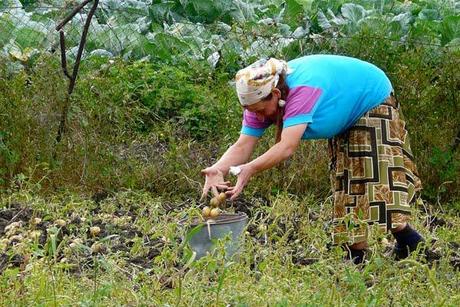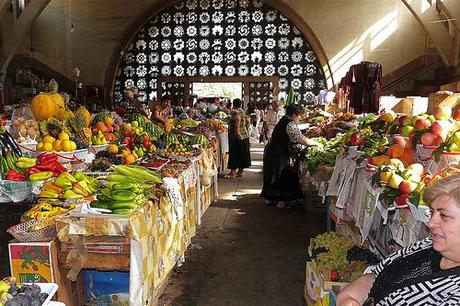The problem with food is that, no matter in what obscure corner of the planet you find yourself, you’ve got to have it. And in order to have it, you have to find it, and then somehow procure it. In some places this means you go hunt and fish, in others you pull victuals out of the ground and pick them off the trees.

Potatoes and cabbage are staples of the Armenian diet
In prosperous countries foraging for food is done in your local supermarket, which is the size of a small banana republic. You hunt around with your shopping cart and harvest items off shelves and from bins. Easy to do for most of us trawling the shopping emporiums of the modern world.
But here’s a story of one of my shopping adventures not in the culinary paradise of the Gourmet Giant in Virginia, USA, nor in the HyperU in France where I now live, but in a small neighborhood grocery store in Yerevan, Armenia, a small country in the Caucasus Mountains where I domiciled for six years. I hadn’t been there long when this drama took place, and at the time there were no modern supermarkets.
Just a Few Eggs, Please
I’m in a small shop not far from my house where the neighborhood housewives go on foot to buy their daily needs. In a place like this, checking off the items on your grocery list is a tricky and humbling task for people who don’t speak Armenian or Russian. I’d be one of these people. Shopping can be an exercise in frustration, or entertainment on a good day. There are reasons for this:
In these little neighborhood shops you don’t pick things off the shelves. Most of the items are kept safe behind counters of which there are several, each tended by a fierce-looking matron with dyed hair — red, black, orange. (Hair dying is the GAP, the Great Armenian Pastime. Everyone participates – teenagers, menopausal mamas, grannies, and even the men. I felt obliged to join in to show respect. But I digress.)
Dairy is sold at one counter, bread at another, processed meats, eggs and canned foods at a third. A few shops have fresh beef, pork and lamb for sale as well, usually in rather large hunks that have not had the benefit of a designer butcher’s knife. This would be sold at counter number four. Sometimes shops carry a small selection of fresh fruit and vegetables in season. A small selection because there is no big selection.

For vegetables and fruit you’d best go to the large covered markets, such as Mashtots market on this photo by Rita Willaert. In the summer these are wonderful places to shop as you can see.
So here I am, an illiterate, you might say, in my corner grocery store. I can’t read the labels, and I can’t speak the language and I’m hungry. I’ve managed to get the bread, the rice, the tea because they’re recognizable and I pointed at them. Now I want eggs. I see no eggs. Where are they? How can I point at them and then raise ten fingers when they are not in sight?
I learned the word for eggs weeks ago, but it now escapes me. It has skipped away, hiding somewhere in my memory refusing to come out like a naughty child behind a sofa. Armenian words have a tendency to do that because they’re not like any other words in any other language in any other place on the planet. I explore every nook and cranny of my brain and cannot find the Armenian word for eggs. I can find it in several other languages, but none of these will do me any good. What to do.
This is what I do: I make the shape of an egg with my fingers. I look at the sales matron with big pleading eyes. She asks me something. I don’t know what she is saying, but she’s not understanding me. We are not getting anywhere, and something else is called for. Something more drastic than mere sign language.
I flap my arms and cluck like a chicken, then follow my performance by once again making the shape of an egg with my fingers.
Four stout mamas are looking at me in stunned silence. The dairy lady, the bread lady, the salami-and-beans lady. All with neatly coiffed hairstyles circa 1973.
I know why they are staring.
In Armenia people take themselves very seriously. You dress very neatly, no wrinkles allowed anywhere. You always have your hair done right and your shoes polished. You do not go around clucking and flapping your arms like a chicken. What would the neighbors think!
Here I am, crazy foreigner, making a fool of myself. It is unthinkable.
Then laughter erupts, rich and full-bodied. The kind of laughter that happens when you’ve not laughed for a long time because life is tough, but now, here’s this weird foreign woman clucking and flapping her arms, how can you contain yourself?
Laughter subsides. My counter lady turns around, steps aside and points at the eggs that have been hiding behind her body.
“Ayo!” I nod eagerly. “Ttass hat,” I say and hold up ten fingers in case she doesn’t understand my sorry Armenian.
She carefully puts the eggs in a plastic bag and shows me the amount I owe her by tapping it out on a little calculator.
I pay. I smile nicely. I say shnorrekaloodjoon, which means thank you, I kid you not. I turn and walk to the door, trying to look dignified, which is, of course, a lost cause.
I’ll be the talk of the neighborhood, but hey, I’ve got my eggs.
_____
NOTE: In the last few years, modern supermarkets have come to Armenia, but the small shops still reign in the neighborhoods.
* * *
So tell me, have you ever made a fool of yourself on purpose, out of necessity? Or not on purpose, for that matter?

